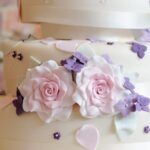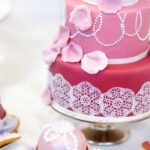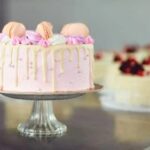A cake decorator is responsible for transforming simple cakes into works of art. They use various techniques, tools, and skills to create visually stunning designs and decorations on cakes. From birthdays to weddings, cake decorators play a crucial role in making special occasions even more memorable through their creativity and expertise.
In the Introduction section of this article, we will delve into the role and responsibilities of a cake decorator. We will explore the artistry behind cake decoration, as well as the essential skills and techniques required for success in this field. Additionally, we will take a closer look at the types of cakes that cake decorators can work on, ranging from simple designs to extravagant creations.
Cake decorating is an intricate craft that requires precision and attention to detail. It involves using various tools such as piping bags, spatulas, and molds to create intricate designs with frosting or fondant. A cake decorator must also possess artistic skills and have a deep understanding of color theory, composition, and design principles.
Join us as we uncover the world of cake decorating in this comprehensive article. Whether you are a professional cake decorator or simply interested in elevating your baking skills at home, this article will provide valuable insights into the fascinating world of cake decoration.
The Artistry Behind Cake Decoration
Cake decoration is not just a simple task; it’s an art form that requires creativity, skills, and imagination. In this section, we will delve into the artistry behind cake decoration and explore the creative process that brings these delectable creations to life.
One of the key aspects of cake decoration is understanding the vision and theme of an event or celebration. Cake decorators work closely with clients to conceptualize and design custom cakes that align with their desires. This involves discussing colors, themes, and any specific details or elements they want to incorporate into the design.
Once the vision is clear, cake decorators then move on to sketching out their ideas on paper. This step allows them to plan the overall look of the cake, including the placement of decorations, patterns, and designs. Sketching also helps them visualize how different elements will come together to create a cohesive and visually appealing final product.
After sketching, cake decorators begin working with various materials and techniques to bring their ideas to life. They use fondant or buttercream icing to cover the cake smoothly before adding intricate details such as flowers, figurines, or hand-piped designs. Sculpting tools are used for shaping different elements with precision while airbrushes or food coloring are used for adding colors and shading.
Throughout this creative process, cake decorators continuously evaluate and make adjustments as needed. They pay close attention to detail, ensuring that every aspect of the design is well-executed. From selecting appropriate colors to achieving proper proportions in their decorations, they strive for perfection in bringing their artistic vision into reality.
Essential Skills and Techniques Required for Cake Decorating Success
Cake decorating is a skill that requires a combination of artistic talent, precision, and attention to detail. In order to succeed in this field, cake decorators must possess several essential skills and techniques.
Design and Color Theory
One of the fundamental skills that a cake decorator must have is an understanding of design and color theory. They need to be able to create pleasing compositions and balance different elements on a cake. This involves knowledge of color harmonies, proportions, and the ability to visualize how different design elements will interact with each other.
Piping and Fondant Work
Piping is an essential technique used by cake decorators to add intricate details and decorative elements onto cakes. It requires steady hands and control over piping bags filled with icing or buttercream. Similarly, fondant work involves rolling out smooth sheets of fondant and using it to cover cakes or create decorative figures, shapes, or textures. Cake decorators must be skilled in working with fondant to achieve a flawless look.
Sculpting and Carving
For custom cake designs or specialty cakes such as 3D or sculpted cakes, cake decorators need sculpting and carving skills. These techniques involve shaping cakes into specific forms or creating intricate designs by removing parts of the cake layers before decorating them. Sculpting and carving require precision, patience, and good spatial awareness.
Airbrushing
Airbrushing is a technique commonly used in cake decorating to achieve smooth gradients of color on cakes. Cake decorators use an airbrush machine along with edible food colors to spray thin layers of color onto the surface of the cake. This technique requires practice to control the pressure, speed, and distance at which the airbrush is used for achieving desired effects.
Sugar Craft
Sugar craft refers to the art of creating decorative pieces using edible materials such as gum paste or sugar paste. Cake decorators skilled in sugar craft can create intricate flowers, bows, and other edible decorations that add a touch of elegance to cakes. This technique requires patience and the ability to work with delicate materials.
Mastering these essential skills and techniques is crucial for cake decorators looking to achieve success in their profession. While it may require time and practice to develop proficiency in each area, honing these skills will allow cake decorators to bring their creative visions to life and deliver stunning cakes that are both visually appealing and delicious.
From Simple to Extravagant
Cake decorators have the exciting opportunity to work on a wide range of cake types, from simple and elegant designs to extravagant and elaborate creations. The type of cake they work on depends on various factors such as the occasion, theme, and client preferences. In this section, we will explore some of the different types of cakes that cake decorators can work on.
Birthday Cakes
Birthday cakes are one of the most common types of cakes that cake decorators create. These cakes are often personalized based on the age and interests of the recipient. For children’s birthday cakes, popular themes include cartoon characters, superheroes, princesses, or animals. On the other hand, adult birthday cakes may feature hobbies or interests like sports teams, fashion brands, or favorite travel destinations.
Wedding Cakes
Wedding cakes are a centerpiece of any wedding celebration and require exquisite attention to detail from cake decorators. These cakes often match the overall theme or color scheme of the wedding and can range from traditional tiered designs to more unique and creative concepts. From intricate lace patterns to delicate sugar flowers, wedding cake decoration is an art form in itself.
Celebration Cakes
Celebration cakes encompass a wide variety of occasions beyond birthdays and weddings. Cake decorators may be called upon to create cakes for anniversaries, baby showers, graduations, retirements, or religious events such as baptisms or bar mitzvahs. These cakes can be customized based on the specific event or milestone being celebrated.
Sculpted Cakes
Sculpted cakes push the boundaries of creativity and require advanced skills from cake decorators. These cakes are often shaped into three-dimensional objects such as animals, cars, buildings, or even life-size replicas. Sculpted cakes not only showcase the decorator’s artistic abilities but also require structural engineering expertise to ensure the cake remains stable.
Specialty Cakes
Cake decorators may also work on specialty cakes that cater to specific dietary restrictions or preferences. These include vegan cakes, gluten-free cakes, dairy-free cakes, or even sugar-free cakes for those with dietary restrictions. Specialty cake decorators have the challenge of creating visually stunning designs while still adhering to specific dietary requirements and considerations.
From birthdays to weddings, celebration cakes to sculpted creations, cake decorators have a diverse range of types of cakes they can work on. Each cake presents its own unique set of challenges and opportunities for creativity. Whether it is bringing a childhood fantasy to life or crafting an elegant masterpiece, cake decorators possess the artistic skills and expertise to turn any cake into a true work of art.
Unveiling the Tools of the Trade
Cake decorating is an art that requires a variety of tools and equipment to create beautiful and intricate designs. Whether you are a professional cake decorator or an amateur looking to elevate your baking skills, having the right tools of the trade is essential. Here is a list of must-have equipment for cake decorators:
Offset Spatula
This versatile tool is used to spread frosting evenly on cakes, smooth out rough edges, and create decorative patterns. Its bent handle allows for greater control and precision.
Piping Bags and Tips
Piping bags are used to pipe frosting onto cakes in various designs, while tips determine the shape and size of the piped decorations. A set of piping tips with different shapes and sizes will allow for endless creativity.
Turntable
A turntable is a revolving platform that makes it easier to frost and decorate cakes from all angles. It allows for smooth rotations while keeping the cake stable.
Fondant Rolling Pin
Fondant is often used to create smooth, flawless finishes on cakes. A fondant rolling pin with adjustable thickness guides helps achieve the desired thickness for covering cakes or creating decorative fondant pieces.
Palette Knife
This long, flat knife with a flexible blade is commonly used for spreading frosting or smoothing fondant on cakes. It provides control and precision when working with delicate decorations.
Dusting Brushes
Dusting brushes are used to apply edible dust or shimmer powder onto cakes for a touch of color or sparkle. They are particularly useful for adding subtle details or creating textured effects.
Silicone Molds
These molds come in various shapes such as flowers, leaves, or geometric patterns and are used to create intricate decorations with fondant or gum paste. They provide a quick and easy way to add detailed designs to cakes.
Having these essential tools will not only make the cake decorating process smoother but also expand your creative possibilities. Investing in quality equipment can make a significant difference in the outcome of your cake decorations and help you achieve professional-looking results. Whether you are just starting out or looking to upgrade your tools, having the right equipment is crucial for any cake decorator’s success.
Step-by-Step Guide
Cake decoration is an art form that requires precision, creativity, and attention to detail. In this section, we will take a closer look at the step-by-step process that cake decorators use to bring their ideas to life.
The first step in the process is brainstorming and planning. Cake decorators will often meet with clients or work alongside event planners to understand the vision and theme of the event. They will discuss color schemes, design elements, and any specific requests from the client. From there, the decorator will sketch out various ideas and create a blueprint for the cake design.
Once the design is finalized, it’s time to prepare the cake. This involves baking multiple layers of cake and allowing them to cool completely before handling. Cake decorators may also need to create fillings, frostings, and other components that will be used in between the layers.
With the cake prepared, it’s time for the fun part – decorating. This starts with applying a smooth layer of icing to create a clean canvas for design. Next, decorators may use various techniques such as piping, fondant shaping, or airbrushing to add texture and dimension to the cake. From delicate flowers to intricate patterns, every detail is carefully crafted by skilled hands.
To complete the process, cake decorators add finishing touches such as edible decorations or personalized messages requested by clients. Attention is given to ensure that all elements are secure and visually appealing.
The Challenges and Rewards of Being a Cake Decorator
Being a cake decorator comes with its own unique set of challenges and rewards. In this section, we will delve into the insights from professionals in the field, shedding light on what it’s like to be a cake decorator.
- Meeting Client Expectations: One of the biggest challenges for cake decorators is meeting client expectations. Each client has their own vision for their cake, and it is the decorator’s job to bring that vision to life. This means understanding and interpreting their ideas accurately while incorporating your own creative flair. Communication skills are essential in order to ensure that both parties are on the same page throughout the process.
- Working Under Pressure: Another challenge for many cake decorators is working under pressure, especially when it comes to tight deadlines. Whether it’s a last-minute order or a large-scale event, decorators often find themselves working long hours to complete their creations on time. The ability to stay calm and focused under pressure is crucial in these situations.
- Finding Inspiration: While being a cake decorator allows for immense creativity, finding inspiration can sometimes be challenging. It is important for decorators to constantly seek new ideas and stay updated with the latest trends in cake design. Attending trade shows, workshops, or joining online communities can provide valuable inspiration from fellow professionals in the field.
While there are certainly challenges involved, being a cake decorator also offers incredible rewards:
- Seeing Joyful Reactions: One of the most rewarding aspects of being a cake decorator is experiencing the joy and excitement from clients when they see their completed cakes for the first time. The ability to create something so visually stunning that brings happiness to others is truly fulfilling.
- Constant Learning and Growth: Cake decorating is an ever-evolving art form, with new techniques and styles emerging regularly. For those who thrive on learning and growing creatively, this career offers endless opportunities to expand one’s skill set.
- 3.Working in Celebration: Being a part of people’s special moments and celebrations is a truly rewarding experience. Whether it’s birthdays, weddings, or other significant milestones, cake decorators have the privilege of contributing to these joyful occasions.
Overall, while being a cake decorator may come with its own set of challenges, the rewards and satisfaction that come from creating edible works of art make it all worthwhile.
How to Become a Cake Decorator
Many people have a passion for baking and a creative eye for design, making the role of a cake decorator an ideal career choice. However, becoming a skilled cake decorator requires more than just a love for sweets. It often involves education, training, and a commitment to honing one’s craft. This section will delve into the path towards becoming a professional cake decorator, including the necessary education and training, as well as potential career paths in this field.
One of the first steps towards becoming a cake decorator is obtaining the right education and training. While formal education is not always required, it can provide aspiring decorators with a solid foundation of knowledge and skills. Many culinary schools offer programs specifically geared towards pastry arts or baking and pastry arts which cover topics such as cake decoration techniques, food safety practices, flavor combinations, and business management skills.
In addition to formal education, hands-on experience is crucial to developing practical skills in cake decorating. Many aspiring decorators choose to gain experience through apprenticeships or internships at bakeries or cake shops.
These opportunities allow individuals to work under experienced professionals who can provide guidance and mentorship while honing their skills in a real-world setting. Furthermore, entering baking competitions or participating in workshops hosted by professional associations can also provide valuable learning experiences and help build a network within the industry.
Career paths for cake decorators are diverse and vary depending on individual goals and interests. Some decorators may decide to work in specialized roles within commercial bakeries or pastry shops, focusing solely on creating custom-designed cakes for weddings, birthdays, or other special occasions.
Others may choose to start their own cake decorating business or work as freelance decorators, providing their services for various events on a contract basis. Some may even find opportunities to work as instructors at culinary schools or become authors of instructional books in the field of cake decoration.
Becoming a successful cake decorator requires dedication, creativity, and continuous learning. By combining formal education with hands-on experience and exploring different career paths, aspiring decorators can build a solid foundation for a rewarding career in the world of cake decoration.
The World of Cake Decoration
Cake decoration is not just about making a cake look pretty; it’s a form of art that allows decorators to express their creativity and bring their unique style to life. In this section, we will explore the world of cake decoration, including different styles and trends that professionals are incorporating into their designs.
One popular style in cake decoration is the use of fondant. Fondant is a type of icing that can be rolled out and draped over the cake, creating a smooth and flawless finish. This technique allows decorators to create intricate designs, such as realistic flowers, ruffles, and even sculpted figures.
Another style gaining popularity is the naked cake trend. These cakes have minimal frosting on the outside, exposing the layers within. They often feature fresh fruit or flowers as a decorative element, resulting in an organic and rustic look.
Trends in cake decoration are constantly evolving, with new ideas emerging all the time. One current trend is metallic accents. Cake decorators are using gold or silver leaf, edible glitters, or metallic paints to add a touch of glamour and elegance to their designs. Geometric designs are also on the rise, with decorators incorporating triangles, hexagons, or other shapes into their creations for a modern and contemporary look.
Tips and Tricks for Amateur Cake Decorators
As an amateur cake decorator, there are numerous tips and tricks you can employ to elevate your baking skills at home. Whether you’re just starting out or looking to improve your abilities, these suggestions will help you create beautiful and professional-looking cakes.
Firstly, practice makes perfect. The more cakes you decorate, the more comfortable you’ll become with different techniques and styles. Experimenting with new designs and challenging yourself to try different piping techniques will not only expand your skillset but also give you the confidence to take on more complex projects in the future.
Secondly, invest in quality tools and equipment. While it’s possible to create stunning cakes with basic supplies, having high-quality tools can make a significant difference in the final result. Invest in a good turntable for smooth rotation, a set of sturdy piping tips for consistent designs, and a quality offset spatula for smooth icing application.
Additionally, consider taking online courses or attending workshops to learn from professionals in the field. These resources can provide valuable insight into advanced decorating techniques and help you refine your skills. Participating in cake decorating communities or forums is another great way to exchange ideas and get feedback from experienced decorators.
In conclusion, by practicing regularly, investing in quality tools, attending professional classes or workshops, and engaging with others who share your passion for cake decorating, you can continually elevate your baking skills as an amateur decorator. With dedication and a commitment to learning new techniques and styles, you can create beautiful works of art that will surely impress your friends and family.
Frequently Asked Questions
What is the responsibility for cake decorator?
The responsibility of a cake decorator is to create visually appealing and delicious cakes for various occasions. They are tasked with transforming plain cakes into beautiful works of art through the use of icing, fondant, and other decorative elements. Cake decorators must have a keen eye for detail and be able to follow specific instructions or design concepts provided by clients.
They are also responsible for selecting appropriate colors, textures, and techniques to bring these designs to life. Additionally, they may be involved in creating custom cake toppers or other edible decorations.
What do cake decorators do everyday?
Cake decorators typically have a diverse range of tasks that they perform on a daily basis. They start their day by reviewing orders and gathering all the necessary ingredients and tools needed for each project. They then proceed to bake the cakes according to specific recipes or customer preferences.
Once the cakes have cooled down, decorators begin applying buttercream frosting or fondant and use their artistic skills to create intricate designs or patterns on the surface of the cake. Attention to detail is crucial during this process as they must ensure that everything is symmetrical, smooth, and visually appealing. Throughout the day, cake decorators may also need to coordinate with clients, finalize design details, clean up their workstations, and keep track of inventory.
What experience do you need to be a cake decorator?
While formal education is not always required to become a cake decorator, experience in baking and an understanding of basic pastry techniques are essential. Many cake decorators start by working in bakeries or pastry shops where they can learn hands-on skills under the guidance of experienced professionals.
Apprenticeships or certificate programs focusing on baking and pastry arts can also provide valuable knowledge in areas such as mixing ingredients, proper temperatures and baking times for different types of cakes, as well as basic piping techniques for frosting application. Additionally, staying updated with current trends in cake decorating through workshops or continuing education courses can help enhance their skills and creativity as they progress in their career as a cake decorator.

Welcome to my blog about home and family. This blog is a place where I will share my thoughts, ideas, and experiences related to these important topics. I am a stay-at-home mom with two young children. I hope you enjoy reading it! and may find some helpful tips and ideas that will make your home and family life even better!





